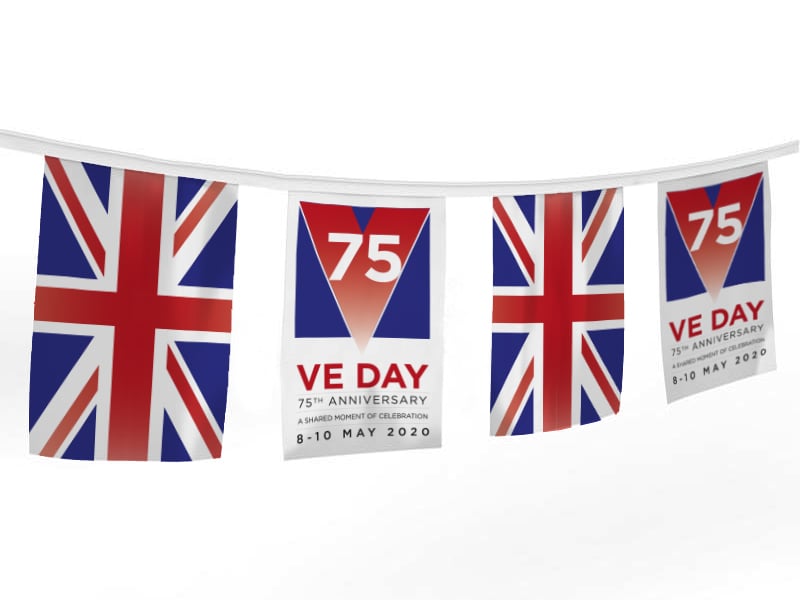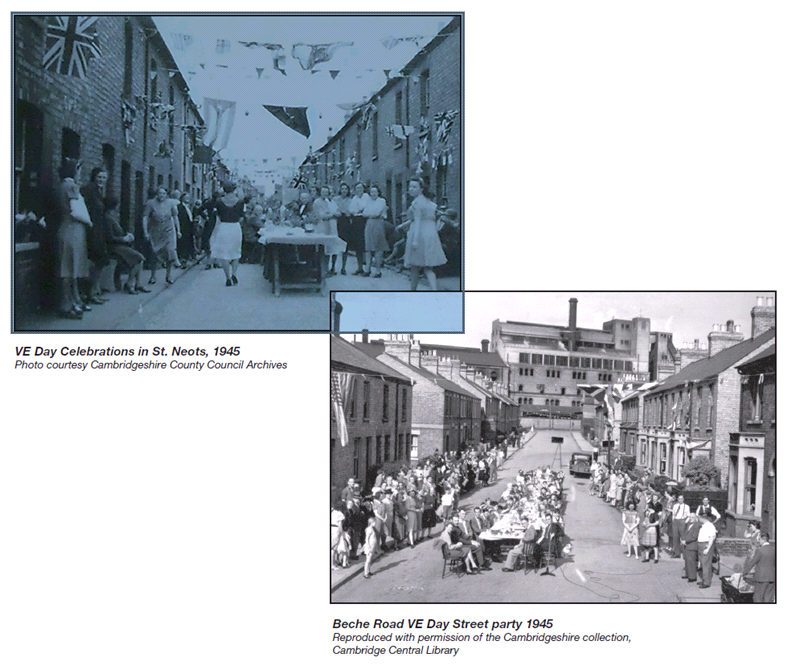VE Day Memories

Published on 07 May 2020 08:34 PM
VE Day 75th Anniversary: 8th May 2020
It is said that the world is currently ‘fighting a war’ against the coronavirus and it is true, as in times of war, for the majority of us our daily lives have changed and tragically people have died. The coronavirus pandemic has impacted our families, schools, employment and leisure. Our NHS service, medics and care workers are our frontline. We talk of meeting up again with our loved ones, friends and colleagues “when this is all over”.
75 years ago family, friends and neighbours came together to celebrate the announcement of the end of the Second World War in Europe. They spoke about community spirit and looking out for each other, sentiments we are seeing reflected today.
You may be living with or shielding someone who lived through this time in history. You may be shopping for an older person or calling them to check they are ok and having a chat. You may be cooking food for a neighbour, sewing face masks or scrubs, you may be a key worker keeping communities safe and society operational. In our own ways we are again showing community spirit and looking after each other,
Age UK Cambridgeshire and Peterborough is supporting many older people and some have kindly shared their memories of VE day with us so we can share them with you. We are in a very privaledged position that so many older people share their memories with us and we can learn about history directly from those who were there and gain insight into very personal experiences.
Here’s just some of their memories and our short video to mark the 75th anniversary. Remembering all those who gave their lives and celebrating our freedom today.
We look forward to meeting up again with all our service users.
VE Day Memories:
Dr Stephen Webster, President of Age UK Cambridgeshire and Peterborough: The world has changed in the last 75* years – for good and for ill – but the memories of the survivors of World War II must survive or we could all make the same mistakes again - as nations and as individuals. *an updated extract from Age UK Cambridgeshire publication Memories of the Second World War.
- At the end of the war, I remember being held up by my father in the massive crowds in front of Buckingham Palace on VE Day, and seeing the Royal Family appear on the balcony. I also remember our street party held a few days later in a field at the end of our road. When I started school in September 1945, I received (like all the other children) a printed certificate from the King, praising all the children for their efforts and fortitude during the hostilities.
- I remember waking one day with my mother shaking me, laughing and crying at the same time saying ‘It’s over!’
- I was a boy who had an old rickety bicycle which did not have any brakes and so to stop it, I had to put my feet on the front wheel! My mum heard the news about the end of the war. She wanted my dad to know so she sent me on my bike from Turves to the farmyard in Eastrea where he was threshing. There were only four cars in our area, so it wasn’t dangerous for me to cycle, but it was hard.
- The end of the war was a great relief for my father. He had four sons and he worried about us all as we got close to the age of being called up. In West Ham when the end of the war was announced, the older men dragged the market stalls, which were on wheels, into the centre of Queen’s Road and set them on fire. I joined in – it was just our way of showing our relief that the war was over.
- I celebrated VE and VJ day with huge crowds in Times Square. At that time, many people thought they’d be demobbed straight away, but that wasn’t the case. Later that year, my crew headed to the naval base at Victoria Island in Vancouver, Canada, where HMS Mull of Kintyre was commissioned. We set off for Australia and got 60 miles from the equator before being ordered to turn around and head for Hong Kong. We spent three weeks there helping to rebuild the harbour before sailing to Japan.
- Life in the army wasn’t easy. Our battalion marched right across France and into Germany. On average we would walk about 20 miles a day – exactly how far depended on how much resistance we met from the enemy. We all had just two of everything – two pairs of socks, two vests, two pairs of shoes and so on, and we had very little time to wash ourselves or our clothes, or even to eat. But in the army you didn’t complain – you just did what you were told. For part of the time I was driving a supply truck, so I was lucky in that I was never involved in hand-to-hand fighting. We ended up in Lübeck and we took over the German barracks there. I was demobbed in August 1946, which was earlier than some of my colleagues, as bricklayers were urgently needed back home to build new houses. So I am grateful to my father for making me learn bricklaying, as it meant I could return to Cambridge and be with my sweetheart again.
- I was sent to Scotland in the war to live with an aunt who was in her eighties. I didn’t want to go there and was desperate to come home. I remember there were delays getting back at the end of the war.
- On VE day, I was near Suez. I had arrived in Egypt on the day that Roosevelt died, which was April 12th 1944. In May I was on transit to Yemen and Eritrea, where I would then be based. Although the crossing was dangerous, I spent much of that transit period between VE and VJ day swimming in the Suez Canal!
- Growing up in Britain during the war years left me with a deep admiration for the spirit, tenacity and sheer courage of the British people when the odds are hugely stacked against them. As Churchill said, “We will never surrender”.
- Despite all of the hardship, the morale of the adults was amazing and they were always singing and telling us funny stories. Neighbours looked out for one another and shared everything. There were a lot of large families and as there were no bunk beds, children slept three or four to a bed. The army issued blankets to help keep us warm in the winter. My father, as well as working at the docks, became the local barber, cobbler, gardener and tailor, but he never charged anyone!
- At the end of the war we went to my grandfather’s neighbouring farm where family and locals had gathered round a huge haystack. My uncle was on top of the haystack shouting and cheering as the haystack was set alight whilst he was still on it. He got off safely!
- On VE day, I was working, but the next day, I joined the many thousands who were celebrating and I climbed to the top of the Albert Memorial where I had a fine view of the Royal Family appearing on the balcony of Buckingham Palace. I also visited the River Clyde, where some of our largest ships, including the Queen Mary and the Queen Elizabeth were at anchor filled with celebrating servicemen due to return to Canada and the US. I was visiting my father’s ship and the launch taking visitors to the ships had to find its way through a mass of empty beer cans, cheered on by the troops looking down on them.
- I enjoyed my time in the land army. Some girls that joined had to live together in a hostel, and were sent to different farms to do farm work, but I only had to do gardening work, and I stayed in the same place until the end of the war. On VE day in 1945 I was still stationed in Newmarket. In 1946, shortly after the end of the war, I left the land army and returned to my parents who were living in Great Shelford. Life seemed a bit strange after the war ended, with on-going rationing and long queues outside the shops, although gradually things got back to normal. I was lucky as I didn’t have to fight in the war and my memories of serving in both the aerodromes and the land army are happy ones.
- My parents evacuated me privately to an aunt living in Thundridge, near Ware in Hertfordshire. She lived near an airfield and I watched the dog fights in the sky at night from the back garden.. After a year my aunt had health problems and I was then moved and officially billeted to a couple living in a place I didn’t know. I remember on my seventh birthday my mother visited me and she brought me a teddy bear. She told me he cost five shillings and she had to look all over London to find him. I simply called him Teddy. I cried on his shoulder often. On VE day my mother immediately came to collect me and bring me home. I went in to our sitting room and my father was laying on the settee injured. He had broken his leg, ironically in putting out celebration bonfires that children were lighting where they shouldn’t! My mother took me to see the victory celebrations at Buckingham Palace. The crowd was huge and I was actually frightened, but very pleased to be home. In fact, I was only home for a short while, as I had to go back to my evacuation home until VJ day in August, after which I was then allowed home for good.
- I remember when the war ended how good it was not to have to worry about bombs or gunfire when I was cycling the four miles to school. And I also remember the village party.
- I now live next door to the house I moved into with my parents in 1937. I remember that on VE day there was a street party with tables all along the road. There was hardly any traffic as in those days, only really rich people had cars. Everyone provided something to eat or drink and the party went on till after dark. It was a very happy day. I am the only person in our street who is old enough to remember that day.
- I enjoyed life in the Wrens stationed near Gosport. I remember celebrating VE day at our local with many other service people. We were very happy on VE day that all the men would be coming home to lots of smiling faces. We were so happy that at last you could sleep in your own bed and not hear bombing all night, or wonder about whether you would be dead or alive in the morning. I remember how everyone helped one another and how brave people were in time of trouble.
- The Kayser Bondor factory in Baldock, where I had lodgings, was turned into a munitions factory and I worked there during the war. On VE day, we had a street party with music and dancing and bunting. We had a really happy time.
- Having spent most of my war service in the Women’s Royal Naval Service in the Portsmouth area, it was strange to find myself in Aberdeen on VE day. As our armies advanced towards Berlin, it was obvious that the end of the war was not far off, so naval activity in the Channel diminished and many bases were dispersed- hence my removal to Aberdeen. The weeks passed and we were all waiting for the war to be over. On May 8th I was off-duty and lying on my bed reading. A friend rushed in to say ‘the war is over’ and I wept!

Covid 19 HOPE Appeal
Can you help us to support older people?
